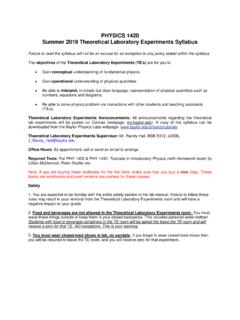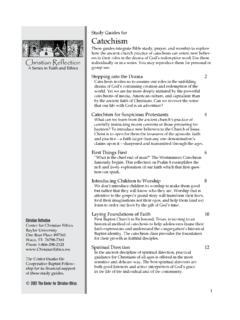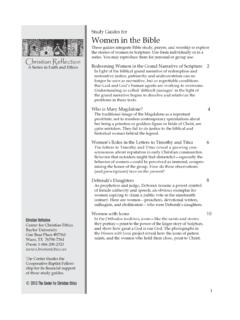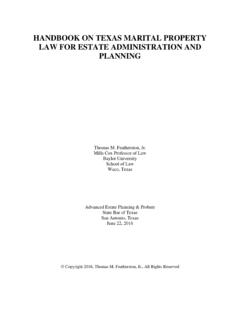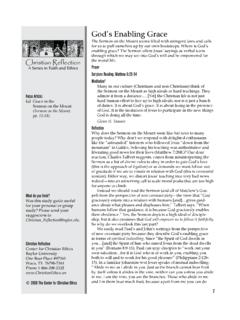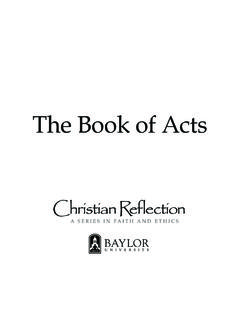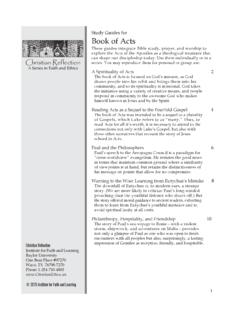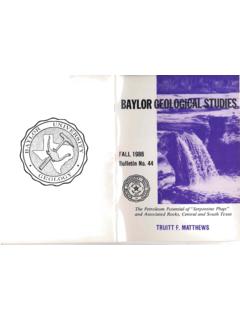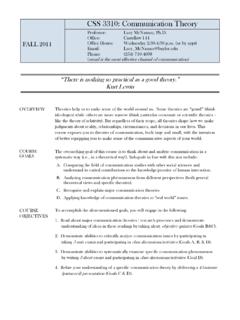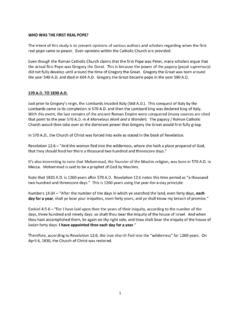Transcription of The deadly sin of pride S - Baylor University
1 40B ay l o r Uni ve r si t y S ch o o l of S o cial Wo r kSexual ethics aside, traditional Christian teaching nowhere clashes more sharply with contemporary sensibilities than on the moral status of pride . Christians have long counted pride as a sin indeed, the original sin that generates every other and is the vital principle in each. Lewis speaks for many Christian moral-ists when he calls pride the essential vice, the utmost evil. He asserts that pride is the complete anti-God state of mind (Lewis, 1980, pp. 121-22). Many people today, however, view pride as a virtue and a key component in emotional maturity and self-actualization. Therapists seek to instill in clients positive self-regard, teachers try to boost stu-dent self-esteem, and social movements justify their programs in the name of gay pride , black pride , and the like. It might seem, therefore, that Christians in the people helping professions are caught between incompatible perspectives.
2 As Christians, they have been taught that pride is a vice; as professionals, they have been trained to view pride as a virtue. Which is true?Most Christian social workers and therapists already know that there is truth on both sides. They have seen how pride causes clients to refuse help or rebel against legitimate authority. They have also seen how people without proper pride become trapped in abusive relation-ships or give up on themselves. What Christian professionals need is a nuanced analysis that integrates insights from the Christian tradition, contemporary social sciences, and reality on the ground in order to distinguish sinful pride from its health-giving cousins. They also need a clear grasp of pride s chief characteristics and consequences in order to rightly apprehend the nature of the countervailing virtue, humility. It is to these needs that I address this ARTICLEThe deadly sin of pridePaul Sands Associate Professor of TheologyGeorge W.
3 Truett Theological Seminary, Baylor University41 Famil y an d Co m m uni t y Minis tr ie sThe NaTure of PrideFew words in our moral vocabulary convey so wide a spectrum of meanings as pride . It can connote anything from narcis-sism to self-confidence to self-respect. Many disagreements over the moral status of pride can be traced to differences in how the word is understood. A classic definition of vicious pride is the one put forward by the Medieval Jewish philosopher, Baruch Spinoza: pride is thinking more highly of oneself than is just, out of love for oneself (Neu, 1999, p. 54). In other words, pride is inordinate self-esteem arising out of self-centeredness. Although correct as far as it goes, this definition does not quite do justice to pride s irreligiousness and aggres-siveness. I would propose, therefore, that pride is best viewed as an irreligious and antisocial assertion of the self.
4 But before fleshing out what this definition entails, it is important to distinguish pride from related but different The CoNCePTPride should not be con-fused with self-respect. Unlike pride , self-respect does not imply feelings of superiority. As the philosopher Jerome Neu points out, it has to do with rights and dignity, not merit (Neu, 1999, p. 74). The person with self-respect has her pride , but that means she is ashamed to violate her conscience, not that she thinks herself better than others (Taylor, 1985, p. 50). Self-respect is indispensable to a life of virtue. It is the skeleton of the soul that protects integ-rity by preventing the wrong sort of flexibility. A person may have too much self-esteem, but no one can have too much self-respect (Neu, 1999, p. 74). pride should also not be confused with proper self-esteem. Christians are sometimes quick to condemn all self-satisfaction as an expression of sin.
5 There is a proper self-esteem that is the result of evaluating oneself with sober judgment (Rom. 12:3). It is not based on stock portfolios, beauty contests, or social prominence; it is the fruit of a clear-eyed as-sessment of one s own character and achieve-ments. As such, proper self-esteem is a barometer that rises and falls with the quality of one s life. Good people should feel good about themselves; bad people should should not be confused with self-love. Christians commonly condemn self-love as a form of narcissism. But Jesus himself commanded his followers to love others as themselves (Matt. 22:39). As Freder-ick Buechner notes, Christ s command can legitimately be reversed to say love your-self as you love others. Buechner adds that self-love does not mean your pulse should quicken every time you look into a mirror any more than its supposed to quicken every time your neighbor passes the window (Buechner, 2004, pp.)
6 322-23). One can care for self and others without being enamored of either. Ob-session with oneself is not true self-love, just as obsession with a lover is not true romance. Finally, pride should not be confused with feeling proud. pride is an endur-ing character trait; feeling proud is a transitory emotion. One can feel proud without being proud. A researcher who discovers an important new cancer therapy can be elated by her achievement without being puffed up by it. Indeed, if her work leads to public honors, she will likely feel both proud and humbled by the recogni-tion. A man whose son joins a prestigious New York law firm might almost burst with pride , but his feelings are a proper and natural expression of love. The father identi-fies with his son and thus shares his elation. Ironically, the failure to feel pride over hon-ors received by oneself or loved ones may actually be an expression of pride .
7 It may reflect a sense of superiority a haughty disdain for honors and the people who give them (Taylor, 1985, pp. 43, 45-46).Proper self-esteem is a barometer that rises and falls with the quality of one s life. Good people should feel good about themselves; bad people should ay l o r Uni ve r si t y S ch o o l of S o cial Wo r kViCious pride Sinful pride must not, then, be confused with self-respect, proper self-esteem, self-love, or feeling proud each of which is essential for human flourish-ing. As already noted, pride is best viewed as an irreligious and antisocial assertion of the self. We see this in the way pride elevates the self over others. We say the proud are stuck up and complain that they look down their noses at everyone else. We complain that they ride a high horse and isolate themselves in an ivory tower. We criticize them for acting high and mighty.
8 The Hebrew Bible often highlights pride s penchant for heights. In the primeval history, humankind seeks to build a tower with its top in the heavens (Gen. 11:4). Proverbs depicts the proud as having lofty eyes (Pro. 30:13). Jeremiah speaks of proud Moab s loftiness (Jer. 48:29; cf. Isa. 2:11). Isaiah records a king s boast that he will ascend to heaven , raise his throne above the stars of God, and make himself like the Most High (Isa. 14:13-14). Another way to say the same thing is to say pride expands the self. The proud are full of themselves puffed up or inflated with self-importance. They fantasize about being larger than life and fear nothing more than shrinking in power or visibility. Proud people assert themselves and disregard the opinions and needs of others. They resent any boundary that constricts their freedom to act as they proud also assert the self by laying claim to glory.
9 They imagine themselves to be radiant with success or beauty or intelli-gence or virtue or piety. Their self-glorification can sometimes lapse into absurdity, as when Nebuchadnezzar surveyed the city of Babylon from atop his palace and exclaimed, Is this not magnificent Babylon, which I have built as a royal capital by my mighty power and for my glorious majesty? (Dan. 4:30). Although scripture says that all human beings have been crowned with glory (Psa. 8:5), Nebuchad-nezzar was not interested in sharing glory with others. pride finds pleasure only in what sets it apart. That is why William May calls pride the sin of the first person singular. Proud people not only put themselves before others, they separate themselves from others sometimes under the cover of religious piety. May notes, for example, that a proud monk will be intent on proving himself to be singular and excep-tional.
10 He will be inclined to fast more, pray longer, sleep less, look sicker than his fellows, proving that he is a singularly holy man. Any discipline that must be done in common with his brothers automatically loses its luster (May, 1967, p. 184).VarieTies of PrideWe can see, then, that pride is an assertion of the self that is both irreligious and antisocial. The actual form pride takes will vary from person to person. In general, however, we may say that the genus pride appears in three species : vanity, conceit, and Vanity. Vanity is preoccupied with ap-pearances. The vain person does not so much seek to be admirable as to be admired. He or she derives self-esteem from the turned head, public honors, and tokens of success. Taylor notes, The vain offer their appearance as a means of seducing others into thinking well of them, which in turn is a means of seduc-ing themselves to think well of themselves (Taylor, 2006, pp.)
